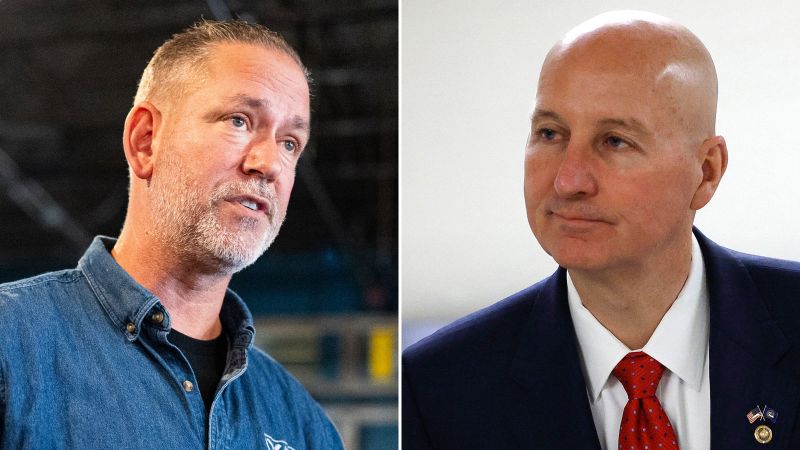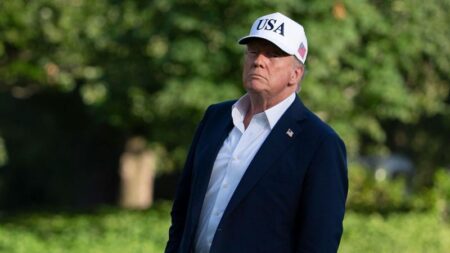Former independent U.S. Senate candidate Dan Osborn officially announced on Tuesday his intention to run for office again next year. This time, Osborn plans to challenge Republican Senator Pete Ricketts of Nebraska. This announcement comes as Osborn reflects on the difficult choice of entering the political arena once more amidst a climate of increasing political violence. In an interview with CNN, he articulated the emotional toll that political candidacy can take on families. “It’s a very difficult thing to put your family through, especially in today’s day and age with the amount of political violence that we’re seeing,” Osborn shared, emphasizing that the decision to run again was not taken lightly. However, he noted that his entire family believes in the cause he champions, which they see as bigger than themselves.
Osborn gained significant attention as a longtime industrial mechanic, particularly after spearheading a strike against Kellogg’s in 2021. His previous campaign against Nebraska Republican Senator Deb Fischer during the 2024 election cycle garnered unexpected support, as he lost by a narrow margin of less than seven percentage points. Remarkably, he accumulated 66,000 more votes than former Vice President Kamala Harris, who faced a substantial defeat in Nebraska during the presidential race, losing by 20 points to Donald Trump. While Osborn has indicated that he does not intend to caucus with Democrats if elected, his candidacy could nevertheless impact the party’s strategy for navigating a challenging Senate map for 2026. Democrats are looking to reduce the Republican majority, which currently comprises 53 seats in the Senate.
As the electoral landscape develops, Republicans are tasked with defending several seats, including a critical one in blue-leaning Maine, where moderate Senator Susan Collins is up for reelection. Additionally, with Senator Thom Tillis deciding to retire, a newly open seat in North Carolina will pose another challenge for the GOP. Meanwhile, Democrats are focused on retaining Senator Jon Ossoff’s seat in Georgia, projected to be a prominent race in 2026, alongside other open seats in states such as Michigan, Minnesota, and New Hampshire.
Osborn’s previous campaign focused on a populist philosophy that interwove conservative views on immigration and gun rights with progressive stances on issues like abortion and campaign finance reform. Despite this complex positioning, he remained clear in distancing himself from the Democratic Party. He notably rejected an endorsement from the Nebraska Democratic Party and maintained that he wouldn’t align with either major party if elected. His opponents, including Fischer and her Republican allies, attempted to label him as a “Democrat-in-disguise,” a characterization that Osborn dismissed.
While national Democrats were largely hands-off during his initial campaign, late injections of support from entities like the Senate Majority PAC—a group that backs Senate Democrats—significantly bolstered Osborn’s efforts, with a substantial $3.8 million contributed in the closing weeks of the election. “I didn’t ask for that money,” Osborn clarified in his conversation with CNN, a remark that seems to underscore his commitment to an independent platform.
Looking forward, Osborn is seeking to forge a distinct contrast with Ricketts. The former two-term Nebraska governor and son of billionaire TD Ameritrade founder Joe Ricketts has made significant decisions that Osborn critiques. Specifically, Ricketts’ support for a sweeping domestic policy law and border security measures under Trump has prompted Osborn to focus on the detrimental impact such policies could have on everyday Nebraskans, stating, “People that are paycheck to paycheck, he just made their lives a heck of a lot harder to give himself a tax cut.”
Senator Ricketts, appointed to his current position in 2023 following the departure of former Senator Ben Sasse, won a special election last year convincingly, finishing 25 points ahead of his opponent. Since then, he has garnered the endorsement of Donald Trump for his reelection bid, solidifying his standing within the party. Trump remarked on his social media platform, labeling Ricketts as a “strong” sentry for border security while labeling Osborn as a “Radical Left Open Border Extremist.”
As the political landscape shifts, Democrats will look to reclaim ground in contests across the country, aiming to challenge Republican holds in states like Texas and potentially broaden their influence in places such as Iowa and Alaska. Political strategist Justin Barasky observed that election maps could expand to include states initially considered unlikely for Democrats, pointing out that new opportunities often arise as elections approach.
This developing electoral situation makes for a compelling political narrative as Osborn’s candidacy takes shape, highlighting the complexities and dynamics of American political contests.











